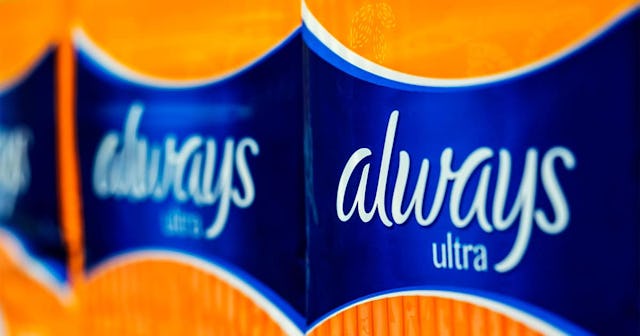Always Removes Female Symbol On Packaging To Be More Inclusive

Always’ packaging change comes in response to customers urging them to make their period products more inclusive
Popular menstrual pad brand Always will no longer add the Venus symbol to its product packaging in order to make their products more inclusive. The Venus symbol, colloquially referred to as the “female symbol” has historically been used to represent women. The change to product packaging is in response to customers who asked the brand to be more welcoming to people who menstruate but do not identify as women.
Transgender activists and allies have publicly urged Always’ parent company, Procter & Gamble, to redesign its pad wrappers without the gendered symbol.
“For over 35 years Always has championed girls and women, and we will continue to do so,” Procter & Gamble said Tuesday in a statement. “We’re also committed to diversity & inclusion and are on a continual journey to understand the needs of all of our consumers. We routinely assess our products, packaging and designs, taking into account consumer feedback, to ensure we are meeting the needs of everyone who uses our products. The change to our pad wrapper design is consistent with that practice.”
LGBTQ health experts said the decision is a small change, but could have significant positive consequences for trans and nonbinary people. “This is a great move,” Dr. Jack Turban, a resident physician in psychiatry at Harvard Medical School, tells NBC News. “First of all, the symbol is unnecessary. Second of all, it sends a message to transgender and non-binary people who need these products that their identities are embraced and supported by the company.”
Some critics have taken to social media to accuse the company of trying to “erase women.”
Many people are still under the impression that transgender and nonbinary people cannot experience menstruation — a claim medical experts have debunked and used to try to educate those who may not fully grasp the nuances of gender.
“Menstruation can occur for anyone with a uterus,” Turban says. “There are many medications that stop or lighten periods — used by both cisgender and transgender people — but these do not completely stop menstruation for all people.”
Also, not all transgender or gender non-conforming people choose to take hormones that may or may not affect menstruation. People who take testosterone, for example, can see their menstrual bleeding deteriorate or even stop, but not all people who take it experience this. Additionally, taking hormones doesn’t affirm gender identity, so plenty of transgender or gender non-conforming people still have a regular menstrual cycle.
Regardless of the ignorance that still surrounds gender identity, seeing a huge brand like Always show they mean business when it comes to being progressive with menstrual pads is a good thing.
“The greatest predictor of good mental health among transgender and nonbinary people is feeling that they are accepted,” Turban says. “The company is showing that it accepts, respects, and cares about this population, which is a powerful statement for a community that is so often marginalized and rejected.”